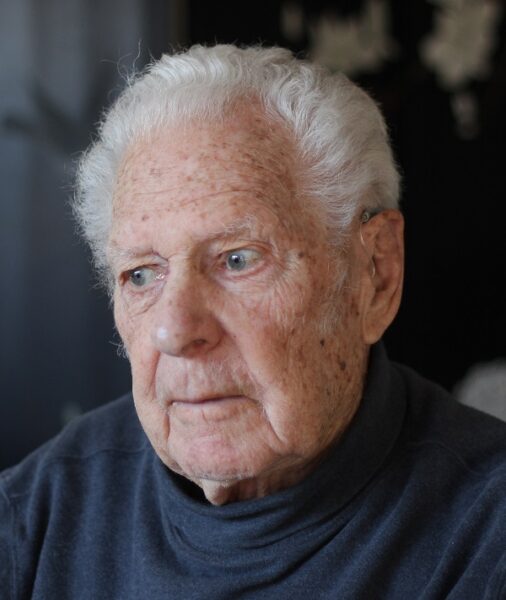
Henry S. Bausum
Henry S. Bausum, a professor and historian who was drawn into editing through service for the AHA, died on January 5, 2019, at his home in Beloit, Wisconsin. He was 94. Although born before the Great Depression, that economic turmoil and the tumult of World War II shaped his life in enduring ways. He gained the confidence to tackle technical puzzles after working alongside his canny and resourceful father on their family farm, and his service with the Army Air Corps earned him access to higher education through the GI Bill.
Bausum began college by enrolling in the dairy program at the University of Maryland, but despite his studies, “one cow looked the same to me as another,” as he later put it. He soon found himself more engaged by an introductory history course, setting him on the path that took him from Maryland to Boston, where he spent a year studying theology at Andover Newton Theological School and gained an MA in history from Boston University before heading to the University of Chicago for his doctorate. By then, Bausum had married Dolores Brister of Pineville, Louisiana, and become the father of a son, David. Years later, the couple added a daughter, Ann, to their family.
It was during his quarter-century of teaching at the Virginia Military Institute (VMI), which began in 1964, that Bausum discovered an aptitude and love for editing. His first experience grew out of a pair of conferences he hosted there in 1974 regarding the future of introductory history instruction. Selected key historians gathered to discuss the topic, including William H. McNeill, whom Bausum had known at Chicago and who was then serving as vice president of the AHA Teaching Division. McNeill subsequently suggested that the organization establish a monthly newsletter column on the topic of history pedagogy and recommended Bausum and historian Myron Marty as coeditors.
Their work debuted in the September 1974 issue of the AHA Newsletter, forerunner of Perspectives on History, under the banner “Innovation in Undergraduate History.” Later the series became known as “Teaching History Today.” Marty dubbed his partner “Barebones Bausum” for his ability to reduce long passages to their essential core. Bausum remained in the post for 10 years, after which he edited a collection of selected columns for publication by the AHA in 1985 under the title Teaching History Today.
The next year, Bausum introduced a spring seminar at VMI on the subject of military leadership that annually brought 10 prominent scholars on the subject to campus for a series of weekly lectures. Embracing emerging technologies, he used an optical scanner to convert prepared remarks into computer files and edited the text for subsequent publication. His three volumes of Military Leadership and Command: The John Biggs Cincinnati Lectures were published in 1986, 1987, and 1988.
As he neared retirement, Bausum proposed that the Society for Military History (then known as the American Military Institute) name him editor of its journal and move its editorial offices to VMI, which they did. The publication became known as the Journal of Military History during his 10-year tenure and remains at VMI to this day. Once again, the former farmer innovated, using computer technology to manage the society’s mailing list, book reviews, and the flow of manuscripts through a newly instituted peer-review process. His son, a mathematician with considerable computer-science savvy, played an instrumental role in this modernization. Bausum applied similar innovations to Air Power History magazine, the quarterly journal of the Air Force Historical Foundation, a publication that he edited from 1991 to 1993.
In 2000, the Bausums retired to Beloit, to be closer to their daughter and her children. For the next 18 years, the couple traveled, exercised, and gardened with equal passion. Bausum is survived by his wife of 71 years, who was herself a gifted editor, author, and scholar. Other survivors include his two children, a daughter-in-law, two grandsons, a married step-grandson, a step-great-granddaughter, and a younger sister.
Out of gratitude for the enduring role that the AHA played in Bausum’s life, the family encourages memorial gifts be made in his name to the organization.
Ann Bausum
Independent historian, Rock County, Wisconsin
This work is licensed under a Creative Commons Attribution-NonCommercial-NoDerivatives 4.0 International License. Attribution must provide author name, article title, Perspectives on History, date of publication, and a link to this page. This license applies only to the article, not to text or images used here by permission.